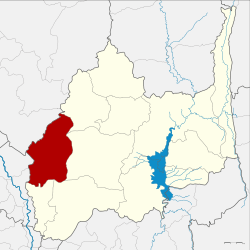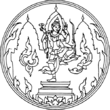Ban Mi District
| Ban Mi บ้านหมี่ | |
|---|---|
| Amphoe | |
 Amphoe location in Lopburi Province | |
| Coordinates: 15°2′41″N 100°32′13″E / 15.04472°N 100.53694°ECoordinates: 15°2′41″N 100°32′13″E / 15.04472°N 100.53694°E | |
| Country |
|
| Province | Lopburi |
| Seat | Ban Mi |
| Tambon | 22 |
| Muban | 157 |
| Area | |
| • Total | 585.7 km2 (226.1 sq mi) |
| Population (2014) | |
| • Total | 77,005 |
| • Density | 146.9/km2 (380/sq mi) |
| Time zone | THA (UTC+7) |
| Postal code | 15110 |
| Geocode | 1606 |
Ban Mi (Thai: บ้านหมี่, pronounced [bâːn mìː]) is a district (amphoe) in the western part Lopburi Province, central Thailand.
History
The district was created in 1883, then named Sanam Chaeng. When the district office was moved to Ban Huai Kaeo, the district name was changed to Huai Kaeo as well. When in 1898 the Thai Government built the Northern Railway through the district, the district center was moved to Ban Sao (Thai บ้านเซ่า) and the district name was changed back to Sanam Chaeng. In 1917 it was renamed to Ban Sao as the name of Tambon of the district center.[1] Finally the Thai Government changed the name to Ban Mi in 1939.[2]
The name Ban Mi is the name of an old town of Phuan people that migrated from Laos to Siam around 1870. The name originates from a hand weaving method to weave cotton or silk fabric, named Mat Mi (มัดหมี่) in Thai.
Geography
Neighboring districts are (from the northeast clockwise) Nong Muang, Khok Samrong, Mueang Lop Buri, Tha Wung of Lopburi, In Buri of Singburi Province, and Takhli of Nakhon Sawan Province.
The water resources of Ban Mi are the Bang Kham River and Khlong Anusasanan.
Administration
Central administration
The district Ban Mi is subdivided into 22 subdistricts (Tambon), which are further subdivided into 157 administrative villages (Muban).
| No. | Name | Thai | Villages | Pop.[3] |
|---|---|---|---|---|
| 1. | Phai Yai | ไผ่ใหญ่ | 6 | 2,604 |
| 2. | Ban Sai | บ้านทราย | 6 | 3,359 |
| 3. | Ban Kluai | บ้านกล้วย | 5 | 2,551 |
| 4. | Dong Phlap | ดงพลับ | 5 | 1,788 |
| 5. | Ban Chi | บ้านชี | 12 | 5,422 |
| 6. | Phu Kha | พุคา | 4 | 2,387 |
| 7. | Hin Pak | หินปัก | 10 | 3,390 |
| 8. | Bang Phueng | บางพึ่ง | 9 | 5,083 |
| 9. | Nong Sai Khao | หนองทรายขาว | 7 | 2,949 |
| 10. | Bang Kaphi | บางกะพี้ | 7 | 1,855 |
| 11. | Nong Tao | หนองเต่า | 8 | 4,155 |
| 12. | Phon Thong | โพนทอง | 7 | 4,850 |
| 13. | Bang Kham | บางขาม | 7 | 2,691 |
| 14. | Don Dueng | ดอนดึง | 8 | 4,308 |
| 15. | Chon Muang | ชอนม่วง | 6 | 3,057 |
| 16. | Nong Krabian | หนองกระเบียน | 9 | 3,331 |
| 17. | Sai Huai Kaeo | สายห้วยแก้ว | 7 | 3,100 |
| 18. | Maha Son | มหาสอน | 8 | 3,409 |
| 19. | Ban Mi | บ้านหมี่ | - | 3,503 |
| 20. | Chiang Nga | เชียงงา | 10 | 3,145 |
| 21. | Nong Mueang | หนองเมือง | 7 | 4,188 |
| 22. | Sanam Chaeng | สนามแจง | 9 | 5,880 |
Local administration
There is one town (Thesaban Mueang) in the district:
- Ban Mi (Thai: เทศบาลเมืองบ้านหมี่) consisting of the complete subdistrict Ban Mi.
There are 20 subdistrict administrative organizations (SAO) in the district:
- Phai Yai (Thai: องค์การบริหารส่วนตำบลไผ่ใหญ่) consisting of the complete subdistrict Phai Yai.
- Ban Sai (Thai: องค์การบริหารส่วนตำบลบ้านทราย) consisting of the complete subdistrict Ban Sai.
- Ban Kluai (Thai: องค์การบริหารส่วนตำบลบ้านกล้วย) consisting of the complete subdistrict Ban Kluai.
- Ban Chi (Thai: องค์การบริหารส่วนตำบลบ้านชี) consisting of the complete subdistrict Ban Chi.
- Phu Kha (Thai: องค์การบริหารส่วนตำบลพุคา) consisting of the complete subdistrict Phu Kha.
- Hin Pak (Thai: องค์การบริหารส่วนตำบลหินปัก) consisting of the complete subdistrict Hin Pak.
- Bang Phueng (Thai: องค์การบริหารส่วนตำบลบางพึ่ง) consisting of the complete subdistrict Bang Phueng.
- Nong Sai Khao (Thai: องค์การบริหารส่วนตำบลหนองทรายขาว) consisting of the complete subdistrict Nong Sai Khao.
- Bang Kaphi Dong Phlap (Thai: องค์การบริหารส่วนตำบลบางกะพี้ดงพลับ) consisting of the complete subdistricts Bang Kaphi and Dong Phlap.
- Nong Tao (Thai: องค์การบริหารส่วนตำบลหนองเต่า) consisting of the complete subdistrict Nong Tao.
- Phon Thong (Thai: องค์การบริหารส่วนตำบลโพนทอง) consisting of the complete subdistrict Phon Thong.
- Bang Kham (Thai: องค์การบริหารส่วนตำบลบางขาม) consisting of the complete subdistrict Bang Kham.
- Don Dueng (Thai: องค์การบริหารส่วนตำบลดอนดึง) consisting of the complete subdistrict Don Dueng.
- Chon Muang (Thai: องค์การบริหารส่วนตำบลชอนม่วง) consisting of the complete subdistrict Chon Muang.
- Nong Krabian (Thai: องค์การบริหารส่วนตำบลหนองกระเบียน) consisting of the complete subdistrict Nong Krabian.
- Sai Huai Kaeo (Thai: องค์การบริหารส่วนตำบลสายห้วยแก้ว) consisting of the complete subdistrict Sai Huai Kaeo.
- Maha Son (Thai: องค์การบริหารส่วนตำบลมหาสอน) consisting of the complete subdistrict Maha Son.
- Chiang Nga (Thai: องค์การบริหารส่วนตำบลเชียงงา) consisting of the complete subdistrict Chiang Nga.
- Nong Mueang (Thai: องค์การบริหารส่วนตำบลหนองเมือง) consisting of the complete subdistrict Nong Mueang.
- Sanam Chaeng (Thai: องค์การบริหารส่วนตำบลสนามแจง) consisting of the complete subdistrict Sanam Chaeng.
References
- ↑ "ประกาศกระทรวงมหาดไทย เรื่อง เปลี่ยนชื่ออำเภอ" (PDF). Royal Gazette (in Thai). 34 (0 ก): 40–68. 1917-04-29.
- ↑ "พระราชกฤษฎีกาเปลี่ยนนามอำเภอ กิ่งอำเภอและตำบลบางแห่ง พุทธศักราช ๒๔๘๒" (PDF). Royal Gazette (in Thai). 56 (0 ก): 877–882. 1939-09-25.
- ↑ "Population statistics 2014" (in Thai). Department of Provincial Administration. Retrieved 2015-08-27.

